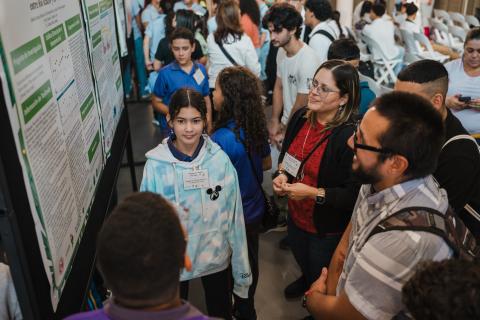Body
Image

Data Jam: Engaging Students with Local Ecological Data in Puerto Rico
Data Jam is an initiative of the Luquillo Long-Term Ecological Research (LTER) Schoolyard program. The Luquillo LTER at the University of Puerto Rico has collected decades of data about the El Yunque rainforest ecosystem and made that data publicly available. The Data Jam program engages middle school and high school students in the process of asking their own questions about environmental phenomena in El Yunque and then in exploring, analyzing and summarizing the long-term data as evidence to investigate their scientific research questions. Successful Data Jam projects require that students engage in a variety of data practices that underlie the STEM field of data science. The Data Jam experience culminates with students presenting their research to their peers and Luquillo scientists at a students science symposium at the visitor center in El Yunque National Forest. The project is iteratively designing and studying a professional development model that engages teachers as apprentices to ecological scientists and provides the teachers with the support they need to engage their students in data-based ecological research. Teachers participate in a weeklong summer professional development program to improve their statistical education skills and prepare them to support students conducting their Data Jam projects. During the school year, teachers participate in Virtual Lab Meetings with up to four other peers and a scientific mentor.
Pillar 1: Innovative Use of Technologies in Learning and Teaching
Students use CODAP to conduct their analyses of data. CODAP’s drag-and-drop interface creates an accessible environment for creating a variety of high-quality visualizations. The Data Jam project has curated Luquillo LTER datasets about hydrology, shrimp populations and dragonfly populations to scaffold students in using CODAP to investigate their own research questions. Data Jam provides students with structured challenge activities that build data science capacity and empower them to develop their own projects.
Pillar 2: Partnerships for Career and Workforce Preparation.
Luquillo LTER scientists serve as Data Jam mentors for both teachers & students. They meet regularly with a team of teachers to provide feedback on Data Jam progress. They also present to each teacher’s class, describing their professional journey and providing an example of Luquillo research. At the end of Data Jam, the mentors attend the symposium and provide students with feedback on their posters. Both teachers and students have commented on the importance of the mentors for building students’ scientific identity.
Pillar 3: Strategies for Equity in STEM Education
An important pillar of Ladson-Billings’ culturally relevant pedagogy model is student empowerment. She stresses that schools should empower students to apply what they are learning to their daily lives. Data Jam exemplifies this empowerment by engaging students in conducting research about their environment. For many teachers, Data Jam is the 1st time they have been able to introduce students to authentic data from a local iconic forest. Data Jam has provided students with a new perspective on their local environment.

Discipline(s)
Data Science
Environmental sciences
Life sciences
Target Gradespan(s)
Middle school (6-8)
High school (9-12)
Target Participant(s)
Youth / students
Educators
Project Setting(s)
Formal Education
Category
Developing and Testing Innovations (DTI)